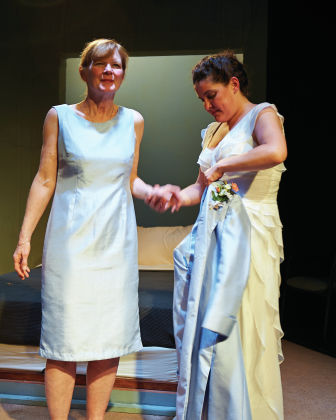
Don't be fooled by the TV-movie premise of A Small Fire. Author Adam Bock's specialty lies in seemingly harmless settings spotted with empty spaces for audiences' imaginations. Theatergoers anticipating a tidy explanation offering insight into the domestic crisis depicted in this curiously unfinished play are hereby warned that what they take away may well be largely what they brought in.
Emily Bridges is the hard-hatted and hard-nosed owner of a construction business, and the likewise tough-luck parent to her daughter Jenny. Only in the company of husband John or foreman Billy does she drop her drill-sergeant demeanor—slightly.
In the weeks preceding Jenny's wedding, however, Emily succumbs to an unexplained malady that causes her to lose first her olfactory powers—smell and taste—then her sight, followed by her hearing. She greets these disabilities with characteristic anger and impatience, but as she grows increasingly dependent on the care of others, her fury gives way to gratitude. On her darkest night of the soul, she is rescued from her physical and existential void by a single act of sexual congress with her devoted spouse. "I felt all of that! I'm still in here!" she rejoices, bringing the play to its abrupt conclusion.
Bock is to be commended for his departures from generic tropes: the inherent saintliness of the afflicted, the domestic roles of men and women—John holds a non-demanding job that allows him to assume what in another age would be called "housewife's duties"—as well as the decision to omit any mention of Billy's same-sex relationship until it becomes relevant to the story (and even then, the label "gay" is never invoked). Of course, this presumes that because Emily is granted interior monologues and sound effects representing the onset of each new impairment, Bock's story is of her descent into helpless despair as she confronts her mortal fragility.
It would be just as easy to view her as a catalytic device for exploring the responses of the people around her: Jenny announces plans to relocate with her new family, and Billy—recalling the loss of his first boyfriend to AIDS—warns John against permitting himself to become wholly immersed in his wife's deteriorating condition.
Fortunately, director Joanie Schultz and the Steep Theater ensemble are accomplished at forging dramatic through-lines from the slightest of textual cues. With microscopic precision, they invest each character with sympathy-generating nuance to render every ambiguous moment of Bock's priapal-romantic parable an exemplary exercise in emotional truth and conviction.
